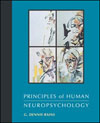In 1882, French neurologist Joseph Jules Dejarine reported an unusual case. His patient, a successful businessman, had awakened one morning to find he had lost the ability to read. He could speak and understand language, he could see, and he could write, yet he could not read, not even what he himself had written. (He could, however, read by touching raised letters.) A few days later, on awakening, the man found that he had also lost the ability to write. What could cause such a puzzling syndrome? The answer to this question, discovered only post-mortem, provided evidence for an important hypothesis about the nervous system in the 19th century—the hypothesis that different areas of the brain are specialized for different functions and that, if connections between areas are disrupted, distinct capabilities are lost. The early history of neuropsychology is marked by individual cases like this one, each contributing some important piece to the puzzle of how the brain works. In this chapter we consider the history of neuropsychology, from the earliest human attempts at understanding how behavior is controlled to the most recent findings about the organization of the brain. |



 2002 McGraw-Hill Higher Education
2002 McGraw-Hill Higher Education